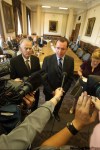Let’s see the ruling on NDP
Advertisement
Read this article for free:
or
Already have an account? Log in here »
To continue reading, please subscribe:
Monthly Digital Subscription
$1 per week for 24 weeks*
- Enjoy unlimited reading on winnipegfreepress.com
- Read the E-Edition, our digital replica newspaper
- Access News Break, our award-winning app
- Play interactive puzzles
*Billed as $4.00 plus GST every four weeks. After 24 weeks, price increases to the regular rate of $19.95 plus GST every four weeks. Offer available to new and qualified returning subscribers only. Cancel any time.
Monthly Digital Subscription
$4.99/week*
- Enjoy unlimited reading on winnipegfreepress.com
- Read the E-Edition, our digital replica newspaper
- Access News Break, our award-winning app
- Play interactive puzzles
*Billed as $19.95 plus GST every four weeks. Cancel any time.
To continue reading, please subscribe:
Add Free Press access to your Brandon Sun subscription for only an additional
$1 for the first 4 weeks*
*Your next subscription payment will increase by $1.00 and you will be charged $16.99 plus GST for four weeks. After four weeks, your payment will increase to $23.99 plus GST every four weeks.
Read unlimited articles for free today:
or
Already have an account? Log in here »
Hey there, time traveller!
This article was published 05/06/2009 (6099 days ago), so information in it may no longer be current.
Just how wrong was the NDP’s past — now discredited — practice of claiming campaign donations-in-kind as expenses was succinctly drawn into focus Wednesday by two party insiders — one now on the outside and another, a cabinet minister, still securely in power.
As Jim Treller, a former campaign agent for an NDP candidate, told reporters what the party did in 1999, and in numerous elections past, was so obviously wrong: "We were charging for expenses we didn’t have." Mr. Treller is joining the call for an inquiry into how the affair was handled by Elections Manitoba, which decided against prosecuting the NDP for wrongdoing.
In the 1999 election campaign, unions billed the NDP for the wages of full-time union workers who joined the campaigns of some NDP candidates. The unions, however, then donated that money back to the party. Claiming the payments as an expense allowed the NDP to collect rebates from Elections Manitoba. In 2003, after a lengthy investigation, the NDP paid back the $76,000 it collected in rebates in an agreement with the provincial agency.
The party has painted the affair as a conflict in interpretation. It insists it could have defended the expense claim in court, but chose instead to bring the matter to a close.
On Wednesday, however, Finance Minister Greg Selinger was pressed to admit he, too, saw the wrong in the scheme when he learned at a 2003 meeting that party officials had altered candidates’ expense claims to turn donations into expenses. Under intense questioning, Mr. Selinger admitted he demanded a letter from the party clearing his campaign of wrongdoing.
Premier Gary Doer has tried to deflect the shame and blame of this scandal, noting Elections Manitoba is an independent body, and it alone made the decision not to prosecute.
Indeed, the public should be able to rely upon the word of the independent agency, but it is refusing to talk. As such, voters cannot judge the actions of Elections Manitoba or fully understand the context, timing and reasoning behind the decision.
No mention of the affair was made until after the 2003 provincial election, when Elections Manitoba posted a few brief paragraphs about the remittance on its website.
Elections Manitoba claims it is barred by law from talking about investigations but a reading of the Elections Act does not support that. Prior to recent amendments, the act said that "an investigation under this act must be conducted in private." It said nothing about releasing information after investigations are complete, after decisions are made.
Chief Electoral Officer Richard Balasko appears to have authority to release details of his investigation to support the decision not to prosecute. The demands for an inquiry arise unnecessarily from suspicions that rise as tidbits about the affair are revealed.
Elections investigations are very much of interest to the public, which needs to know that parties, candidates and elections officials conduct themselves with care and integrity. The amended act now says the electoral officer may release information about the outcome of investigations, but that leaves too much discretion in the hands of an official who ought to be fully accountable to the public.
Mr. Balasko has adopted a "trust me" attitude that is caustic to an open, transparent elections system. His refusal to explain his decision casts a pall over his office, forcing people to imagine why the party in power escaped prosecution. He should release details of the 1999 investigation, the agreement behind the late repayment and Elections Manitoba’s reasons not to prosecute.


